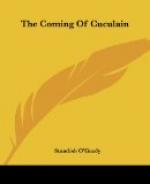After that Fergus departed from Emain Macha and went away with his people into the east to his own country. There he debated and considered for a long time, but at last, so great was his affection for the Clan Usna, that he went over the Moyle in ships to the country of the Albanagh and brought home the sons of Usna, and they were slain by Concobar Mac Nessa, according as he had promised by the word of his mouth. Then Fergus rebelled against Concobar, drawing after him two-thirds of the Red Branch, and amongst them Duvac Dael Ulla and Cormac Conlingas, Concobar’s own son, and many other great men, but the chiefest and best and most renowned of the Ultonians adhered to the King. The whole province was shaken with war and there was great shedding of blood, but in the end Concobar prevailed and drove out Fergus Mac Roy. After that expulsion Fergus and three thousand of the Red Branch fled across the Shannon and came to Rath Cruhane, and entered into military service with Meave who was the queen of all the country west of the Shannon.
There is nothing told about Cuculain in connection with this war. It is hard to imagine him taking any side in such a war. But, in fact, he was still a schoolboy under tutors and governors and could not lawfully appear in arms, seeing that he was not yet knighted. He was either with the smiths or, having procured a worthy hound to take his place, he had gone back to the royal school at Emain Macha. But the time when Cuculain should be knighted, that is to say, invested with arms, and solemnly received into the Red Branch as man to the high King of all Ulla, now drew on, and such a knighting as that, and under such signs, omens, and portents, has never been recorded anywhere in the history of the nations.
In the meantime, Fergus and his exiles served Queen Meave and were subduing all the rest of Ireland under her authority, so that Meave, Queen of Connaught, became very great and proud, and in the end meditated the overthrow of Ulster and the conquest of the Red Branch. Queen Meave and Fergus leading the joined host of the four remaining provinces, Meath, Connaught, Munster, and Leinster, certain of success owing to a strange lethargy which then fell on the Ultonians, did invade Ulster. But as they drew nigh to the mearings they found the in-gate of the province barred by one man. It is needless to mention that man’s name. It was Dethcaen’s nursling, the ex-pupil of Fergus Mac Roy, the little boy Setanta grown into a terrible and irresistible hero. It was by his defence of Ulster on that occasion against Fergus and Meave and the four provinces, that Cuculain acquired his deathless glory and became the chief hero of the north-west of the world. So these chapters which relate to the abduction of Deirdre and the rebellion and expulsion of Fergus, are a vital portion of the whole story of Cuculain. We must now return to the hero’s schoolboy days which, however, are drawing to a memorable conclusion.




